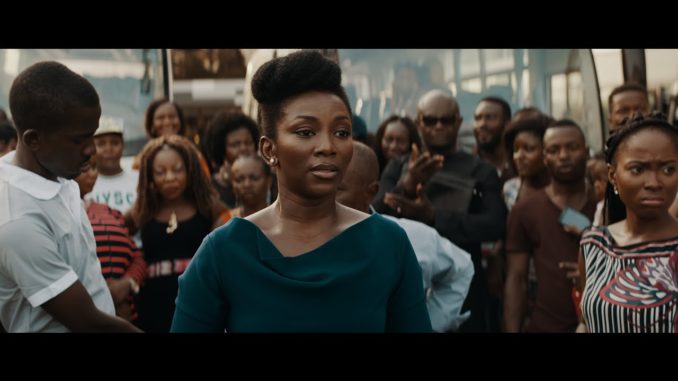
The most powerful scene in Genevieve Nnaji’s directorial debut, Lionheart, takes place between Nnaji’s Adaeze and her uncle, Godwill. They’re sitting in the back of a car and Adaeze stares at her uncle, anxiety written into every feature and says: “We’re supposed to do this together.” Her uncle takes her hand and responds: “You need to speak to him yourself, one leader speaking to another leader.”
In Genevieve Nnaji’s film, women do not sit on the sidelines, on or off screen. Off the screen, Nnaji has achieved what no other Nigerian director has achieved before: a deal with Netflix prior to release, making Lionheart the first Netflix Original Film from Nigeria. Coupled with a premiere at the 2018 Toronto International Film Festival and generally positive reviews, Nnaji’s film has met enough success to guarantee a nomination in 2019’s African Movie Academy Awards. And it’s easy to see why.
Behind the camera Nnaji is formidable. Her aerial shots of Enugu and Kano, the film’s two main locations, are transformative. Nnaji rejects the usual displays of mounting trash, smoke-fogged streets and greening water. Lionheart’s backgrounds are brilliant blue skies, lines of egg yolk yellow danfo buses, red tiled roofs and blinding white paint. Every frame is saturated with colour and life. Lionheart’s Nigeria is what everyone wishes Nigeria was: clean, orderly and beautiful. Nnaji’s keen eye for detail is inescapable, from Adaeze’s starched peplum dresses to the carefully arranged pens on her father, Chief Obiagu’s desk, there isn’t so much as a stray pebble in sight. Nnaji brings this thorough pedantic approach not only to her directing but her acting too.
On screen, Nnaji has also recreates what a lot of Nigerian women can easily relate to: a story about the daily struggle of women’s’ lives, without making it about men. Feminism has been a long debated topic in Nigeria over the past two years with protests such as #SlutWalk, #MarketMarch and #JusticeforOchenye bringing it to the forefront of the public’s attention. As a result, several different media outlets to tell women’s stories as they battle through a culture that sees them as inferior to men. Not many succeeded where Nnaji’s film succeeds: the story isn’t actually about women. The spotlight is often on men: how they control and antagonize women and women must confront and challenge them. But Nnaji provides a new perspective: the men in Adaeze’s life aren’t barriers, they’re stepping stones.
Adaeze’s Uncle, Godswill, excellently portrayed by Nkem Okoh as the endearing high-spirited comic relief, is Adaeze’s emotional foil. He’s chaotic where she’s methodical and a warm heart to her cold logic. Godswill turns Adaeze’s systematic life upside down and hilarity ensues: early office hours are allotted as praise and worship and the desk of the supervisor becomes a random seat in the break room. Over the course of their relationship, Adaeze realises life doesn’t always go according to plan and in order to deal with high-stress situations, she needs to let loose a little.
But while Adeaze learns that lesson, her uncle never directly teaches her. Uncle Godswill, while he’s the new supervisor, never at any point in the film commands Adaeze. He does what he wants but when she confronts him, he doesn’t raise his voice or speak over her: he listens and he decides to do things her way instead because she offers more logical alternatives. When their deals have fallen through and they have only three days left to save the company, he points out an alternative he’d mentioned before, a Northern bus company that might be willing to merge with theirs. And it’s Adaeze who approves and tries to do things his way.
Although it is Godswill’s goodwill that brings the opportunity they seek closer home, when they arrive at the company headquarters, he won’t follow her inside: “You have to talk to him alone, from one leader to another leader.” Adaeze goes in herself, scores the merger, saves the company from ruin and is made the new MD. There’s no doubt that this is Adaeze’s story: her uncle’s character exists only to aid in her emotional growth.
The list of everything Nnaji gets right in this film is long but the most important one besides gender is ethnicity. Nnaji shows off all the best parts of Nigerian culture: family, tradition and culture while leaving behind it’s worst aspects: tribalism. Nnaji deals with the tricky sensitive issue of tribalism by not doing anything about it at all. The closest we get to it is when Adaeze’s father bemoans the Northern company is Hausa, before meeting with the head of the said company and revealing he speaks Hausa because he grew up in Zaria.
When Godswill breaks up a 419 ring made up of Igbo boys, he tells them off saying they “tarnish the Igbo image.” Adaeze’s love interest is Hausa but the topic isn’t even discussed. Questions of tribal differences aren’t given a space in Lionheart, presenting a Nigeria where there is no conflict and hence only peace.
Overall, Lionheart is a film about what it means to become a successful female leader that hopefully someday will inspire more women to become successful leaders. And it deserves every award it gets.
END

Be the first to comment